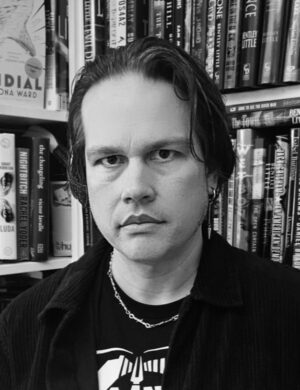
What inspired you to start writing?
I was a lover of horror at a very young age (we’re talking like two years old and I was already obsessed with monsters). I was reading by age three, and by about year seven or eight, I found Stephen King, which led to eventually discovering Cabal by Clive Barker at age 11 or 12 (a very queer book not only because of its author, and still my favorite novel to this day). Barker was what really inspired me to start writing. I wrote a full novel freehand in high school, just for fun—I had zero plans to do anything with it and it was terrible anyway. But I never stopped writing, even if it was primarily lyrics for the various bands I was in for the next couple of decades. Then, in my mid-to-late 30s I decided to take my fiction a little more seriously. Since horror was my first love, I took the dark path.
What was it about the horror genre that drew you to it?
I loved the monsters and related to them. It wasn’t really about being scared to me. Even as a kid, I very rarely found myself scared by horror. I was, however, attracted to the intensity and darkness, and the often crazy FX of horror films in the 80s.
Do you make a conscious effort to include LGBTQ material in your writing and if so, what do you want to portray?
Not particularly. Early on, I simply often included queer characters in my work because I felt a kinship with them despite not realizing I was queer myself (that came MUCH later when I started doing drag in my mid-to-late 40s, which was actually less than two years ago).
What has writing horror taught you about the world and yourself?
That what horror means to me very rarely means the same to someone else. I often think my work is so out of step with what most people envision as horror that it might more accurately be horror-adjacent. I’ve also learned that it’s difficult to create anything fictional that’s more horrific than what occurs in the real world.
How have you seen the horror genre change over the years? And how do you think it will continue to evolve?
The genre goes through so many cycles that it’s hard to keep track and impossible to predict how it will evolve. It’s why I only write what moves me because trying to match the current trends or anticipate them will almost certainly leave you in the dust.
How do you feel the LGBTQ community has been represented thus far in the genre and what hopes do you have for representation in the genre going forward?
It’s being best represented by its own voices (and well-intentioned allies who eschew stereotypes). I hope for more representation of atypical nonbinary folks such as myself (which I’m pushing in a current manuscript I’m pitching). I think the most common public perception of what it means to be nonbinary, while totally valid, doesn’t represent the wide range of ways in which someone can experience being nonbinary. This is precisely why I didn’t have a full realization of my own identity until much later in life. I felt like some sort of queer imposter.
Who are some of your favorite LGBTQ characters in horror?
May (from the criminally underrated Lucky McKee film May). Eli from Let the Right One In (both the novel and the original Swedish film). Ghost from several of Poppy Z. Brite’s novels and shorts. Trixie from my own novel Secrets of the Weird (guilty of the ultimate bias, sure, but I love her so much and hope to tell more stories featuring her one day).
Who are some LGBTQ horror authors you recommend our audience check out?
Aside from Barker and Brite, who I’ve already mentioned, I’ll add Eric LaRocca, Indra Das (actually not sure offhand how they identify, but The Devourers is a VERY queer book and it’s fantastic, so I’ll include them regardless), and Grant Morrison (not strictly horror, but they’re an enormous inspiration to me, both on a personal and creative level).
What is one piece of advice you would give horror authors today?
Write the stories that only you can write, and hopefully, readers show up to the party.
And to the LGBTQ writers out there who are just getting started, what advice would you give them?
Basically the same advice as my last answer, but also to let your work be as queer as you think it needs to be, regardless if it’s marketable or not. Do it because it’s the story YOU need to tell, written the way only YOU can tell it.
 Chad Stroup is the creator of the novels Secrets of the Weird and Sexy Leper, as well as the short story collection Teeth Where They Shouldn’t Be. When not writing, he is also the vocalist for the band Icepield and a fierce drag queen by the name of Jenn X. No, he doesn’t sleep much.
Chad Stroup is the creator of the novels Secrets of the Weird and Sexy Leper, as well as the short story collection Teeth Where They Shouldn’t Be. When not writing, he is also the vocalist for the band Icepield and a fierce drag queen by the name of Jenn X. No, he doesn’t sleep much.

